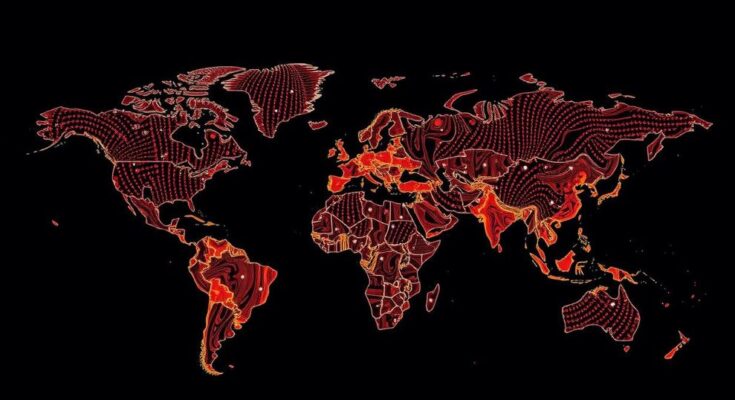The article highlights new SEC-mandated disclosures from major oil and mining companies that reveal payments made to governments worldwide, uncovering discrepancies in tax contributions between the U.S. and other nations. It underscores the need for increased financial transparency to combat corruption in the extractive industries, illustrated by the personal story of Tutu Alicante regarding the failed promise of oil wealth in Equatorial Guinea. The discussions advocate for reforms in corporate taxation while emphasizing the protection of citizens’ rights to benefit from their countries’ natural resources.
In 1996, Tutu Alicante’s family faced grave medical emergencies in Equatorial Guinea, highlighting the dire healthcare situation despite the influx of oil wealth following Mobil’s discovery of oil off the coast. Tragically, Alicante lost both his sister and his father due to inadequate medical facilities, emphasizing the disparity between the country’s economic growth and the quality of life for many citizens. Currently serving as the executive director of EG Justice, a nonprofit focused on corruption in Equatorial Guinea, Alicante shared his compelling experiences during a recent webinar. This event was centered around new disclosures from American oil and mining companies regarding payments made to global governments, mandated by the U.S. Securities and Exchange Commission (SEC) after years of lobbying for transparency. The reports revealed substantial financial contributions amounting to tens of billions of dollars made by corporations such as ExxonMobil and Chevron in taxes, royalties, and other payments. The intent of these disclosures is to unveil potential corruption in the extractive industry, which has historically enabled wealth accumulation by elites while failing to alleviate poverty in resource-rich countries. Alicante noted, “For a majority of people in my country, the issues we are here to talk about are issues of life and death: Who lives a posh life…and who dies an avoidable death.” In Equatorial Guinea, citizens can now observe that ExxonMobil allocated $189.2 million to the government, a small fraction compared to the $32 billion paid globally by the company to various nations. Chevron similarly reported payments of $16.6 billion to 17 countries. This transparency allows citizens and civil society groups to assess whether governments are receiving appropriate remuneration for the extraction of their natural resources. However, discrepancies in the tax payments to the U.S. when compared to other nations reveal deeper issues. Aubrey Menard from Oxfam America noted, “What is revealing in the U.S. is that we are likely getting a bad deal.” ExxonMobil, while producing significant quantities of oil and gas domestically, paid nearly five times more in taxes to the United Arab Emirates than to the U.S. Chevron exhibited a similar trend, raising questions about the fairness of tax burdens. Oil companies have contended that varying payment structures and local tax regimes complicate comparisons between nations. However, Zorka Milin of the Financial Accountability and Corporate Transparency Coalition remarked on the oil industry’s resistance to detailed reporting, arguing that the information disseminated could illuminate tax disparities and encourage policy reforms. As Congress deliberates potential reforms of corporate tax policies, particularly against the backdrop of the Biden administration’s proposals to eliminate certain fossil fuel tax benefits, the reported data on taxes could serve as a valuable tool for advocacy. Furthermore, Simon Taylor from Global Witness argued that, overall, several countries are failing to secure equitable deals regarding their natural resources, often resulting in predatory concessions that favor corporations over local states. These revelations stem from an amendment to the Dodd-Frank Wall Street Reform and Consumer Protection Act passed in 2010, aimed at enhancing transparency in the extractive industries. However, the rules have faced legal challenges and reductions in scope due to political shifts, hindering the full potential impact of the disclosures. Despite these shortcomings, advocates maintain that the available data can spur discussions on reforming how oil companies operate both domestically and internationally.
The article discusses the financial transparency of oil and mining companies following the SEC’s requirement for disclosures regarding payments made to governments worldwide. It highlights the wealth generated from natural resources in countries like Equatorial Guinea that has not translated into improved living conditions for many citizens. The narrative is framed by the personal experiences of Tutu Alicante, who witnessed the effects of inadequate healthcare exacerbated by corruption and economic disparity. It also emphasizes the need for transparency to assist civil society in monitoring government revenues from extractive industries, shedding light on possible corruption and inequitable deals. The piece also critiques the discrepancies in tax payments made by major oil companies like ExxonMobil and Chevron in comparison to the benefits accrued in countries where they operate. It presents a broader discussion on the importance of reforming corporate tax policies in the context of the ongoing energy transition and the role of government in negotiations with multinational corporations.
In conclusion, the recent disclosures mandated by the SEC represent a significant step towards enhancing transparency in the financial dealings of oil and mining companies with governments worldwide. This newfound visibility aims to empower citizens and civil society organizations to hold their governments accountable regarding the management of natural resource revenues. However, the persistent discrepancies in tax payments between the U.S. and other countries suggest a need for further scrutiny and reform in how corporations negotiate agreements with states. Overall, the discourse initiated by these findings may pave the way for necessary changes in the governance of extractive industries globally, ensuring that the wealth derived from natural resources benefits all citizens equitably.
Original Source: insideclimatenews.org




